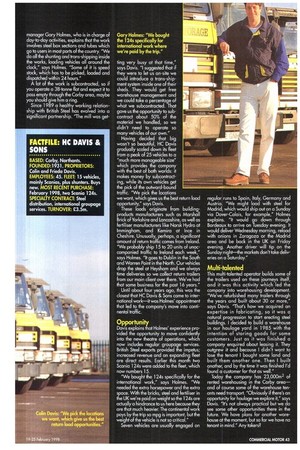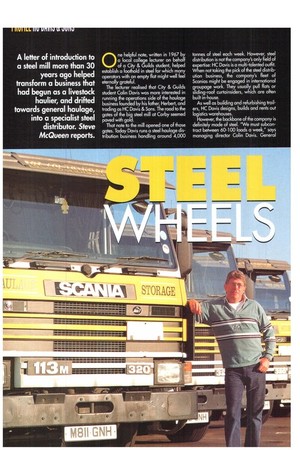FACTFILE: 11C DAVIS & SONS BASED: Corby, Northants. FOUNDED:1931. PROPRIETORS:
Page 45

Page 44

If you've noticed an error in this article please click here to report it so we can fix it.
Colin and Frieda Davis. EMPLOYEES: 45. FLEET: 15 vehicles, mainly Scanias, plus shunters. Buys new. MOST RECENT PURCHASE: February 1998, two Scania 124s. SPECIALTY CONTRACT: Steel distribution, international groupage services. TURNOVER: £3.5m.
A letter of introduction to a steel mill more than 30 years ago helped transform a business that had begun as a livestock haulier, and drifted towards general haulage, into a specialist steel distributor. Steve McQueen reports.
One helpful note, written in 1967 by a local college lecturer on behalf of a City & Guilds student, helped establish a foothold in steel for which many operators with an empty flat might well feel eternally grateful.
The lecturer realised that City & Guilds student Colin Davis was more interested in running the operations side of the haulage business founded by his father, Herbert, and trading as HC Davis & Sons. The road to the gates of the big steel mill at Corby seemed paved with gold. That note to the mill opened one of those gates. Today Davis runs a steel haulage distribution business handling around 4,000 tonnes of steel each week. However, steel distribution is not the company's only field of expertise: HC Davis is a multi-talented outfit. When not taking the pick of the steel distribution business, the company's fleet of Scanias might be engaged in international groupage work, They usually pull Flats or sliding-roof curtainsiders, which are ohen built in-house.
As well as building and refurbishing trailers, HC Davis designs, builds and rents out logistics warehouses. However, the backbone of the company is definitely made of steel. "We must subcontract between 60-100 loads a week," says managing director Colin Davis. General manager Gary Holmes, who is in charge of day-to-day activities, explains that the work involves steel box sections and tubes which go to users in most parts of the country. "We do all the shunting and trans-shipping inside the works, loading vehicles all around the clock," says Holmes. "Some of it is speed stock, which has to be picked, loaded and dispatched within 24 hours."
A lot of the work is subcontracted, so if you operate a 38-tonne flat and expect it to pass empty through the Corby area, maybe you should give him a ring.
Since 1989 a healthy working relationship with British Steel has evolved into a significant partnership. "The mill was get
ting very busy at that time," says Davis. "I suggested that if they were to let us on-site we could introduce a trans-shipment system inside one of their sheds. They would get free warehouse management and we could take a percentage of what we subcontracted. That gave us the opportunity to subcontract about 50% of the material we handled, so we didn't need to operate so many vehicles of our own."
Having decided that big wasn't so beautiful, HC Davis gradually scaled down its fleet from a peak of 25 vehicles to a "much more manageable size" which provides the company with the best of both worlds: it makes money by subcontracting, while its own vehicles get the pick of the outward-bound traffic. "We pick the locations we want, which gives us the best return load opportunity," says Davis. These loads originate from buildingproducts manufacturers such as Marshall Brick of Yorkshire and Lancashire, as well as fertiliser manufacturers like Norsk Hydro at Immingham, and Kemira at Ince in Cheshire. Unusually, perhaps, a significant amount of return hoffic comes from Ireland. 'We probably ship 15 to 20 units of unaccompanied traffic to Ireland each week," says Holmes. "It goes to Dublin in the South and Warren Point in the North. Our vehicles drop the steel at Heysham and we always time deliveries so we collect return trailers From our main client over there We've had that same business for the past 16 years." Until about four years ago, this was the closest that HC Davis & Sons came to international work—it was Holmes' appointment that led to the company's move into continental traffic.
Opportunity
Davis explains that Holmes' experience provided the opportunity to move confidently into the new theatre of operations, which now includes regular groupage services. British Steel exports provided the impetus; increased revenue and an expanding fleet are direct results. Earlier this month two Scania 124s were added to the fleet, which now numbers 15.
'We bought the 124s specifically for the international work," says Holmes. 'We needed the extra horsepower and the extra space. With the bricks, steel and fertiliser in the UK we're paid on weight so the 124s are actually a hindrance to us here because they are that much heavier. The continental work pays by the trip so mpg is important, but the weight of the vehicle is not so critical." Seven vehicles are usually engaged on regular runs to Spain, Italy, Germany and Austria. "We might load with steel for Madrid, which would ship out on a Sunday via Dover-Calais, for example," Holmes explains. "It would go down through Bordeaux to arrive on Tuesday evening. It would deliver Wednesday morning, reload with onions in Zaragoza or the Madrid area and be back in the UK on Friday evening. Another driver will tip on the Sunday night—the markets don't take deliveries on a Saturday."
Multi-talented
This multi-talented operator builds some of the trailers used on these journeys itself, and it was this activity which led the company into warehousing development. "We've refurbished many trailers through the years and built about 30 or more," says Davis. "That's how we acquired an expertise in fabricating, so it was a natural progression to start erecting steel buildings. I decided to build a warehouse in our haulage yard in 1985 with the intention of storing goods for some customers. Just as it was finished a company enquired about leasing it. They outgrew it and because I didn't want to lose the tenant I bought some land and built them another one. Then I built another, and by the time it was finished I'd found a customer for that as well."
Today the company has 23,000m2 of rented warehousing in the Corby area— and of course some of the warehouse tenants need transport. "Obviously if there's an opportunity for haulage we explore it," says Davis. "It's not always practical but we do see some other opportunities there in the future. We have plans for another warehouse at the moment, but so far we have no tenant in mind." Any takers?




































































































